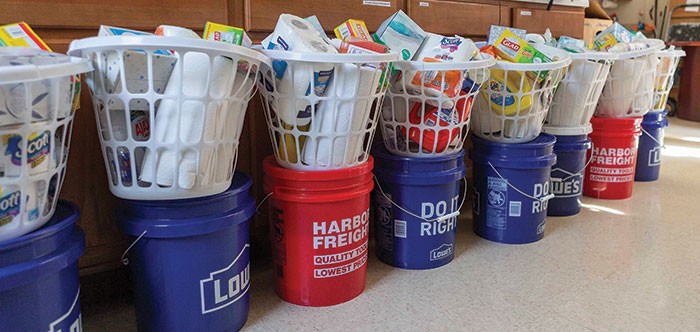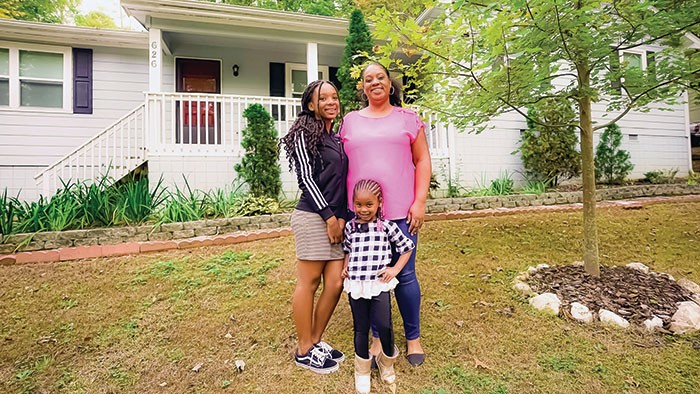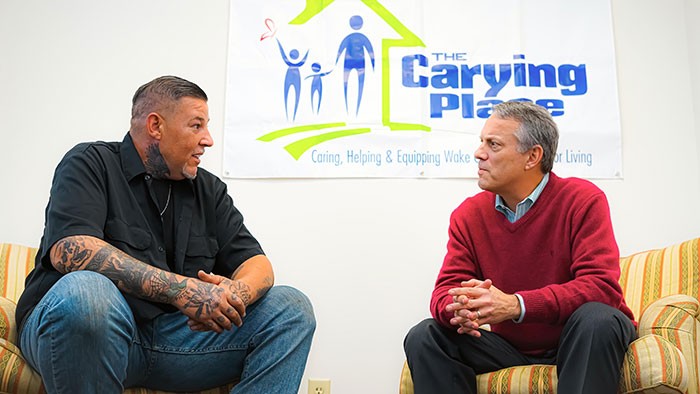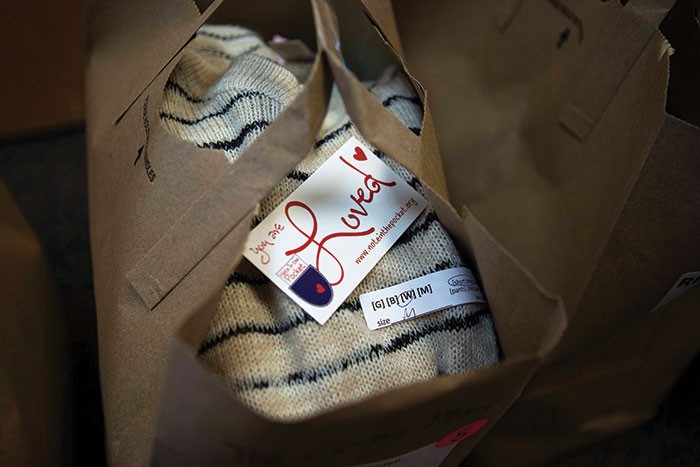In 2012, Mary Mosley lost her apartment lease due to a rent increase and could not find another home she could afford.
For eight years, she searched for a solution. She stayed with family, moved in with a roommate and tried a rooming house, only to discover it was infested with rats.
“My credit was bad, and I couldn’t afford the rent by myself,” Mosley said. “There were so many things on my plate that prevented me from getting an apartment.”

Leslie Covington, executive director of The Carying Place, says it’s vital to empower the whole family, so children are less likely to become homeless adults.
Looking to change her trajectory in 2020, she contacted NC 211, a referral service provided by United Way of North Carolina. They connected her to The Carying Place.
Today, Mosley, along with her son who was also facing financial hardship, and his young daughter, are living in a two-bedroom apartment. She has money in savings and plans to buy a home within the year.
“My whole experience with the program has just been a blessing,” Mosley said.
Mosley’s story is one of many. The Carying Place is approaching its 28th anniversary, having served upwards of 450 families over the years.
As the COVID-19 pandemic causes financial strife for an increasing number of families, Leslie Covington, executive director of The Carying Place, is looking ahead to 2021 when the group will be called upon even more.
The Carying Place assists and empowers homeless working families with children. It teaches budgeting and life skills, while at the same time offering families free transitional housing for up to four months. Families must be homeless or in imminent danger of homelessness, be working full-time and have a child or children under age 18 in the household.
“We do it that way because we don’t just want to assist adults – they are important and are learning those essential life and budgeting skills – but our whole goal is to change the trajectory of the children as well,” Covington said. “These children are then less likely to become homeless adults.”

Household products line the wall, ready to be given to families served by The Carying Place.
Over the years, the organization benefitted from the work of more than 300 volunteers, and today has four staff members. That group of staff and volunteers serves around 30 families each year.
When COVID-19 hit, things began to look different. The organization barely missed a beat, however.
Where each of The Carying Place’s clients normally meets in person every Thursday with a team of volunteers to go over budgeting, share success stories and talk through problems, COVID meant re-thinking those meetings, Covington says.
The organization moved quickly to ensure everyone had a working computer and could implement Zoom as their new form of communication. Volunteers went one week without their Thursday meeting and were meeting with families online by the next week, Covington says.

In 2019, single mom graduate Kai H. and her two daughters stand in front of one of The Carying Place’s houses, which families can stay in for up to four months. The family simply needed some financial literacy education and help with housing to get back on their feet.
Families are required to carry a notebook at all times to write down their weekly progress and weekly goals, and that moved online as well, she says. Families still carry a physical notebook but now must input that data online for sharing.
The intake process changed as well. Families are normally interviewed in person to assess their fit for the program, and the organization moved to virtual evaluations instead.
The number of families served decreased a bit in 2020 as the nonprofit made these changes. Though they continued working with their current families, The Carying Place stopped taking new families for a couple of months.
“We had to do a deeper search of where people are that need help, how are they getting to us, and how can we safely get them to us,” Covington said. “Our numbers suffered because of that, but we do expect our numbers to soar.”

The Carying Place graduate Mike E., left, speaks with volunteer Todd Crouse, who helped Mike reach his housing, budgeting, and life skills goals. They have continued the relationship as friends.
The Centers for Disease Control and Prevention’s (CDC) national eviction moratorium was due to expire on Dec. 31, so Covington and The Carying Place’s board of directors knew they needed to prepare for a rush of applications.
They’ve applied in the past for Community Development Block Grants from the Town of Cary and plan to do so again to purchase more properties to provide temporary housing. They’re also considering raising funds to rent apartments in the event that they cannot afford to buy enough properties, she says. Another idea is potentially expanding their properties outside of Cary to areas including Raleigh and Apex.
“We just know the need is just going to overwhelm many of us if we are not prepared for it,” Covington said.
Finally, The Carying Place is exploring ways to help families that are not homeless but need the structure that comes with the budgeting and life skills classes in order to stay afloat, she says.
As 2021 begins, the nonprofit seeks both volunteers and financial support, Covington says. She also hopes the greater community will take a moment to think about their own perceptions of homelessness.
“Homelessness looks different than many of us understand, and it will look different in the future,” she said. “All it takes is one hiccup to come and knock them off their feet, and they are deemed homeless.”
- 2021 Maggy Awards: Restaurants
- 2021 Maggy Awards: Lifestyle
- 2021 Maggy Awards: Shopping
- 2021 Maggy Awards: Services
- Presenting the 2021 Maggy Awards!
- Apex High School Remembers Beloved Soccer Coach
- The Devil’s in the Details
- Nonprofit Spotlight: The Carying Place
- Small Business Spotlight: The Refinery Salon
- Osha Thai Kitchen & Sushi
- Liquid Assets: Phat Thor Stout from Norse Brewing
- Liquid Assets: Last Call & Quick Decisions
- Garden Adventurer: Color Your World with Kalanchoe






